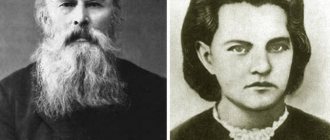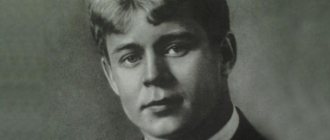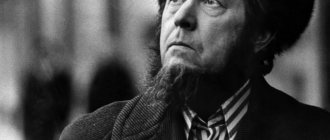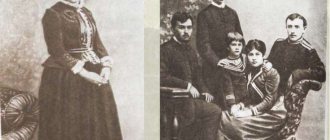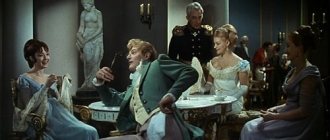Biography and personal life of the poetess
Who is Anna Akhmatova? Anna Akhmatova is a famous Russian poetess of the Silver Age, literary critic and translator. She was nominated for the Nobel Prize in Literature.
Childhood and education
Where was Anna Akhmatova born? Anna was born in 1889 near Odessa in the family of a hereditary nobleman. Andrei Gorenko, the father of the future poetess, was a retired naval engineer. Mother Inna Erasmovna took care of the housework and housework. In addition to Anna, the family had six children.
Anna's maiden name is Gorenko. The father was afraid that his daughter would disgrace the family with her poetic passions, so at a young age she took a creative pseudonym - Akhmatova.
Unknown facts about famous writers. Anna Akhmatova
Childhood
♦ Anna Andreevna Akhmatova (real name - Gorenko) was born into the family of a marine engineer, retired captain of the 2nd rank at the station. Big Fountain near Odessa. The mother, Inna Erasmovna, devoted herself to the children, of whom there were six in the family: Andrei, Inna, Anna, Iya, Irina (Rika) and Victor. Rika died of tuberculosis when Anya was five years old. Rika lived with her aunt, and her death was kept secret from the other children. Nevertheless, Anya felt what had happened - and as she later said, this death cast a shadow throughout her entire childhood.
♦ Akhmatova considered the poets I. Annensky and A. S. Pushkin to be her teachers. Since childhood, Anna strove to be faithful to the high Pushkin tradition. She saw a mystical meaning in one of her childhood finds: while walking with her nanny along the alley of fragrant Tsarskoe Selo, surrounded by greenery, she saw a pin in the shape of a lyre in the grass. Little Anya was sure: this pin was dropped by Alexander Sergeevich, who wandered along these alleys about a century ago. Pushkin and Akhmatova are a separate topic. One day, around 1940, Pushkin dreamed about her friend Faina Ranevskaya. Ranevskaya called Akhmatova. Anna, turning pale with excitement, exhaled briefly : “I’m going immediately,” and added with envy: “How happy you are!” I never dreamed of Him."
Akhmatova did not hide the fact that she could not stand Natalya Goncharova; it looked like she was jealous. When talking about Pushkin, Anna Andreevna became airy, unearthly. Her friends and admirers, with whom this lonely woman was always surrounded, got the impression that she loved only Alexander Sergeevich and no one else.
♦ Anna grew up in an atmosphere quite unusual for a future poet: there were almost no books in the house, except for the thick volume of Nekrasov, which Anna was allowed to read during the holidays. The mother had a taste for poetry: she read the poems of Nekrasov and Derzhavin to the children by heart, she knew a lot of them. But for some reason everyone was sure that Anna would become a poetess - even before she wrote the first line of poetry.
♦ Anna began to speak French quite early - she learned it by watching her older children’s classes. At the age of ten she entered the gymnasium in Tsarskoe Selo.
♦ A few months later, the girl became seriously ill: she lay unconscious for a week; They thought she wouldn't survive. When she came to, she remained deaf for some time. One of the doctors later suggested that it was smallpox - which, however, left no visible traces. The mark remained in her soul: it was from then on that Anna began writing poetry.
Gumilev
♦ On Christmas Eve 1903, Anna met
Nikolai Gumilyov
. Then 14-year-old Anya Gorenko was a slender girl with huge gray eyes that stood out sharply against the background of a pale face and straight black hair. Seeing her chiseled profile, the ugly 17-year-old boy realized that from now on and forever this girl would become his muse, his Beautiful Lady, for whose sake he would live, write poetry and perform feats.
♦ She struck him not only with her extraordinary appearance - Anna was beautiful with a very unusual, mysterious, bewitching beauty that immediately attracted attention: tall, slender, with long thick black hair, beautiful white hands, with radiant gray eyes on an almost white face, her profile resembled antique cameos. Anna stunned him and was completely different from everything that surrounded them in Tsarskoe Selo.
The mermaid has sad eyes. I love her, the undine maiden, Illuminated by the secret of the night, I love her glowing gaze And the burning rubies... Because I myself am from the abyss, From the bottomless abyss of the sea. (N. Gumilyov “Mermaid”)
♦ At that time, the ardent young man tried his best to imitate his idol Oscar Wilde. He wore a top hat, curled his hair, and even wore a little lipstick. However, in order to complete the image of a tragic, mysterious, slightly broken character, Gumilev was missing one detail. All such heroes were certainly consumed by fatal passion, tormented by unrequited or forbidden love - in general, they were extremely unhappy in their personal lives. Anya Gorenko was ideal for the role of a beautiful but cruel lover. Her unusual appearance attracted fans, and it soon became clear that Anna did not have any reciprocal feelings for Nikolai.
♦ The cold reception did not in the least diminish the ardor of the poet in love - here it is, that same fatal and unrequited love that will bring him the desired suffering! And Nikolai eagerly rushed to win the heart of his Beautiful Lady. However, Anna was in love with someone else. Vladimir Golenishchev-Kutuzov, a tutor from St. Petersburg, was the main character in her girlish dreams.
♦ In 1906, Gumilev left for Paris. There he hopes to forget his fatal love and return as a disappointed tragic character. But then Anya Gorenko suddenly realizes that she lacks the blind adoration of the young poet (Akhmatova’s parents found out about their daughter’s love for a St. Petersburg tutor and separated Anya and Volodya out of harm’s way). Nikolai's courtship flattered Akhmatova's pride so much that she was even going to marry him, despite the fact that she was still in love with the St. Petersburg tutor. In addition, Gumilyov’s eternal conversations about fatal love were not in vain - now Akhmatova herself is not averse to playing the role of a tragic figure. Soon she sends Gumilyov a letter complaining about her uselessness and abandonment.
♦ Having received Akhmatova’s letter, Gumilev, full of hope, returns from Paris, visits Anya and makes her another marriage proposal. But the matter was ruined... by dolphins. Then Akhmatova was vacationing in Yevpatoria. While walking along the beach with Gumilyov and listening to declarations of love, Anya came across two dead dolphins washed ashore. It is not known why this spectacle influenced Akhmatova so much, but Gumilyov received another refusal. Moreover, Akhmatova cynically explained to the loving Nikolai that her heart was forever occupied by Golenishchev-Kutuzov.
Double portrait: Anna Akhmatova and Nikolai Gumilev. T. M. Skvorikova. 1926
♦ The rejected poet leaves for Paris again, believing that the only acceptable way out of the situation is suicide. The suicide attempt was staged with the theatricality and pomposity characteristic of Gumilyov. The poet goes to the resort town of Tourville to commit suicide. The dirty water of the Seine seemed to Gumilyov an unsuitable haven for the tormented soul of a young man in love, but the sea was just right, especially since Akhmatova more than once told him that she loved looking at the sea waves. However, the tragedy was destined to turn into a farce. The vacationers mistook Gumilyov for a tramp, called the police, and, instead of going on his final journey, Nikolai went to the police station to give an explanation. Gumilev regarded his failure as a sign of fate and decided to try his luck in love again. Nikolai writes a letter to Akhmatova, where he again proposes to her. And again he is refused.
♦ Then Gumilev tries to commit suicide again. This attempt was even more theatrical than the previous one. Gumilev took poison and went to await death in the Bois de Boulogne. Where he was picked up in an unconscious state by vigilant forest rangers.
♦ At the end of 1908, Gumilyov returned to his homeland. The young poet never gave up his dreams of winning Akhmatova’s heart. And therefore he continues to besiege Anna, swearing eternal love to her and proposing marriage. Either Akhmatova was touched by such almost canine devotion, or Gumilyov beat her consent with stories about unsuccessful suicide attempts, or the image of the St. Petersburg tutor faded somewhat, but one way or another Anna gave her consent to the marriage. But, agreeing to marry Gumilyov, she accepted him not as love - but as her Fate.
“Gumilev is my destiny, and I humbly surrender to it.
Don't judge me if you can. I swear to you, everything that is sacred to me, that this unfortunate man will be happy with me” (A. Akhmatova)
♦ None of the groom’s relatives came to the wedding; the Gumilev family believed that this marriage would not last long.
After the wedding
“Beautifully proportioned women, worth sculpting and painting, always seem clumsy in dresses.”
Amedeo Modigliani
♦ After the wedding, the Gumilevs left for Paris. Here Anna meets Amedeo
Modigliani
, a then unknown artist who makes many of her portraits. Something similar to a romance even begins between them - but as Akhmatova herself recalls, they had too little time for anything serious to happen. “Anna and Amedeo” is not so much a love story as just an episode from the life of two people charred by the breath of art.
♦ Later Akhmatova o
.
A detailed post about Anna and Amadeo was already on Gossip, back in 2009. Therefore, I see no point in covering it again. I’ll only add portraits of Akhmatova, works by Modigliani (1911) Anna Akhmatova on the trapeze. 1911
♦ Regarding the portraits, Akhmatova said the following: “He did not draw me from life, but at his home - he gave these drawings to me. There were sixteen of them. He asked me to frame them and hang them in my room. They died in a Tsarskoye Selo house in the first years of the Revolution. The one that has survived is the one in which his future “nudes” are less foreshadowed than in the others...”
♦ For Nikolai Gumilev, marrying Anna Gorenko was not a victory. As one of Akhmatova’s friends from that period put it, she had her own complex “life of the heart,” in which her husband was given a more than modest place. She didn’t even raise an eyebrow when her loving husband, who had been wooing her for so many years, left for Africa in search of adventure five months after the wedding. She hated exotic things and went into the other room when he started talking about his travels in Abyssinia and hunting tigers. And for Gumilev it turned out to be not at all easy to combine in his mind the image of a Beautiful Lady - an object of worship - with the image of a wife and mother. Therefore, just two years after his marriage, Gumilyov starts a serious affair. Gumilyov had light hobbies before, but in 1912 Gumilyov fell in love for real. Immediately after returning from Africa, Gumilyov visits his mother’s estate, where he encounters his niece, the young beauty Masha Kuzmina-Karavaeva. The feeling flares up quickly, and it does not go unanswered. However, this love also has a touch of tragedy - Masha is mortally ill with tuberculosis, and Gumilyov again enters the image of a hopeless lover. Anna was not shocked by the news of this - it was as if she knew in advance that this would be exactly the case, and had prepared revenge ahead of time. Returning home from Paris, Anna deliberately inserted a bundle of Modigliani’s letters into a volume of poems by Théophile Gautier and slipped the book to her husband. They were even and generously forgave each other.
♦ Akhmatova has a hard time - she has long been accustomed to the fact that she is a goddess for Nikolai, and therefore it is difficult for her to be overthrown from the pedestal and realize that her husband is capable of experiencing the same high feelings for another woman. Mashenka's health quickly deteriorated, and shortly after the start of their affair with Gumilyov, Kuzmina-Karavaeva died. True, her death did not return Akhmatova to her husband’s former adoration. And then, in 1912, Anna Andreevna decided to take a desperate step and gave birth to Gumilyov’s son, Lev. Gumilyov perceived the birth of the child ambiguously. He immediately organizes a “demonstration of independence” and continues to have affairs on the side. He has a choir of lovers from among his students, one even gave birth to a child for him. Continuing to maintain their marriage and friendship, Akhmatova and Gumilyov deal blow after blow to each other. However, Anna has absolutely no time to seriously suffer from her husband’s infidelity. She has long called Nikolai Stepanovich a friend and brother. Subsequently, Akhmatova will say: “Nikolai Stepanovich has always been single. I can’t imagine him being married.”
Sorin S. Akhmatova. 1914
♦ It’s amazing how these two managed to produce a son. The birth of Gumilvenka, as the baby’s friends christened it, did not make a visible impression on the couple. Both of them spent more time writing poems in honor of this event than fussing with the child. But mother-in-law Anna Ivanovna softened towards her daughter-in-law and forgave her everything for her grandson. Little Levushka settles firmly in the arms of a happy grandmother.
♦ In 1914, Gumilev leaves for the front, and Akhmatova begins a whirlwind romance with the poet Boris Anrep. And only Anrep’s emigration to England put an end to their relationship. However, Anrep was not the only one close to Akhmatova.
Anna with her son Leo
♦ In September 1921, schoolchildren decided not to give textbooks to nine-year-old Leva Gumilyov. Simply because on August 25 his father was shot on charges of involvement in a White Guard conspiracy. The last thing the poet wrote was:
I laughed at myself
And I deceived myself
When I could have thought that in the world
Is there anything other than you.
1920
Other marriages
♦ Subsequently, Akhmatova married three more times, but all her marriages ended in divorce. Probably, the great poetess was not suited to the role of a wife. However, for all her husbands, and first of all for Gumilyov, Akhmatova became an ideal widow. She renounced him alive, revered by everyone, but dead, shot by the Bolsheviks, she remained faithful to the end. She kept his poems, took care of their publication, helped enthusiasts collect information for his biography, and dedicated her works to him.
Anna Akhmatova.
L.A. Bruni. 1922 ♦ When Gumilev finally returned to Russia (after the war he spent some time in London and Paris), Akhmatova tells him stunning news: she loves another, and therefore they will have to part forever. Despite the cool relationship between the spouses, the divorce was a real blow for Gumilyov - he still loved his Beautiful Lady Anya Gorenko. After her divorce from Gumilyov in 1918, Anna Andreevna wandered among acquaintances until she was sheltered in the service apartment of the Marble Palace by the orientalist Voldemar Shileiko.
♦ He translated masterfully from Akkadian and was superbly educated. And at the same time, he is capricious, contentious, sarcastic and rude, which for some reason Akhmatova steadfastly endured, believing that her new husband was a little crazy. Their relationship amazed those around them.
“I learned French by ear, in the lessons of my older brother and sister,” said Akhmatova.
“If a dog had been taught as much as you, it would have become a circus director long ago!”
- responded Shileiko. 1924
Shileiko tore her manuscripts and threw them into the stove and melted the samovar with them.
For three years Anna Andreevna dutifully chopped wood because Shileiko had sciatica. When she thought that her husband was healed, she simply left him. And she said with a satisfied sigh: “Divorce... What a pleasant feeling!”
Submissive to you?
You are crazy! I am submissive to the Lord's will alone. I don’t want any trepidation or pain, My husband is an executioner, and his house is a prison. 1921
But after their breakup, he did not hesitate to compare the poetess to a dog. So he said: “... in my house there was a place for all the stray dogs, so there was one for Anya.”
Akhmatova herself composed the following poems:
From your mysterious love,
As if in pain, I scream.
Became yellow and fitful,
I can barely drag my feet.
Afterwards, in 1922, the poetess married art critic Nikolai Punin ♦ Nikolai Punin had long been in love with Anna and, when she was again left homeless, proposed to her. Akhmatova and Punin had to live together with his ex-wife Anna Evgenievna and daughter Ira. Anna Andreevna donated monthly “feed” money to the common pot. The second half of her meager income, leaving only for cigarettes and the tram, she sent her mother-in-law’s son to Bezhetsk to raise.
Anna Akhmatova and N. Punin in the courtyard of the Fountain House, 1920
♦ We lived strangely. “It’s always like this with me,” Akhmatova explained briefly. In public, Punin pretended that nothing connected them with her. When one of Anna Andreevna’s acquaintances came, Nikolai Nikolaevich, an art critic and a brilliantly educated person, did not even greet the guest, read the newspaper, as if he had not seen anyone. With Anna they were invariably on first-name terms. Punin in later years
♦ When Akhmatova made attempts to leave this absurd life, Punin lay at his feet and said that he could not live without her, and if he did not live and receive a salary, the whole family would die. Finally (to the great jealousy of Leva’s son) maternal tenderness has awakened in her: she is busy with Punin’s daughter. Punin pointedly does not notice Leva, who, upon arrival from Bezhetsk, gets an unheated corridor to spend the night. Anna with her son Leo
“Living in the Punins’ apartment was bad... Mom paid attention to me only to teach me French. But given her anti-pedagogical abilities, it was very difficult for me to perceive this,”
- the no longer young Lev Nikolaevich has forgotten the insults.
After breaking up with Akhmatova, Punin was arrested and died during his imprisonment in Vorkuta.
Akhmatova’s last love was pathologist Garshin
(writer's nephew). They were supposed to get married, but at the last moment the groom abandoned the bride. The day before, he dreamed of his late wife, who begged: “Don’t take this witch into your house!”
Out of favor with the authorities
Excerpts from the Report “On the need to arrest the poetess Akhmatova”
No. 6826/A dated June 14, 1950 was handed over to Stalin by the USSR Minister of State Security
Abakumov
.
Beginning in 1924, Akhmatova, together with Punin, grouped hostile literary workers around her and organized anti-Soviet gatherings in her apartment. On this occasion, the arrested Punin
showed:
“Due to anti-Soviet sentiments, Akhmatova and I, talking with each other, more than once expressed our hatred of the Soviet system, slandered the leaders of the party and the Soviet government and expressed dissatisfaction with various measures of the Soviet government... Anti-Soviet gatherings were held in our apartment , which were attended by literary workers from among those dissatisfied and offended by the Soviet regime... These persons, together with Akhmatova and me, discussed events in the country from enemy positions... Akhmatova, in particular, expressed slanderous fabrications about the allegedly cruel attitude of the Soviet government towards peasants, was indignant at the closure of churches and expressed her anti-Soviet views on a number of other issues.”
Self-portrait of A. Akhmatova with charcoal from December 30, 1926
As the investigation established, in these enemy gatherings in 1932–1935. Akhmatova’s son, Lev Gumilyov, at that time a student at Leningrad State University, took an active part. About this, the arrested Gumilyov
showed:
“In the presence of Akhmatova, we at gatherings without hesitation expressed our hostile sentiments... Punin made terrorist attacks against the leaders of the CPSU (b) and the Soviet government... In May 1934, Punin, in the presence of Akhmatova, figuratively showed how he would commit a terrorist act against the leader of the Soviet people."
Similar testimony was given by the arrested Punin, who admitted that he harbored terrorist sentiments against Comrade Stalin, and showed that these sentiments were shared by Akhmatova:
“In conversations, I made all sorts of false accusations against the Head of the Soviet State and tried to “prove” that the existing situation in the Soviet Union can be changed in the direction desired for us only through the violent elimination of Stalin... In frank conversations with me, Akhmatova shared my terrorist sentiments and supported malicious attacks against the Head of the Soviet State.
Thus, in December 1934, she sought to justify the villainous murder of S.M. Kirov, regarding this terrorist act as a response to the excessive, in her opinion, repressions of the Soviet government against Trotskyist-Bukharin and other hostile groups.” It should be noted that in October 1935, Punin and Lev Gumilyov were arrested by the NKVD Directorate of the Leningrad Region as members of an anti-Soviet group. However, soon, at the request of Akhmatova, they were released from custody.
Speaking about his subsequent criminal connection with Akhmatova, the arrested Punin testified that Akhmatova continued to conduct hostile conversations with him, during which she expressed malicious slander against the CPSU (b) and the Soviet government.
In 1935, Akhmatova managed to rescue her arrested son and husband after a personal meeting with Stalin. But before this happened, both were interrogated “with partiality” and were forced to sign false testimony against Akhmatova - about her “complicity” in their “crimes” and about her “enemy activities.” The security officers manipulated the facts masterfully. Numerous intelligence denunciations and eavesdropping materials were also constantly collected against Akhmatova. The “operational development case” was opened against Akhmatova in 1939. The special equipment in her apartment had been working since 1945. That is, the case has long been concocted, all that remains is to bring it to its logical conclusion - arrest. All that is required is Stalin's go-ahead.
Portrait of the poetess Anna Akhmatova. White Night. Leningrad. A. A. Osmerkin. 1939-1940
♦ Akhmatova quickly mastered the science of being the mother of a prisoner. Akhmatova spent seventeen months in prison queues, the “three hundredth, with the transfer” stood under the Crosses. One day, while climbing the stairs, I noticed that not a single woman was looking at the large mirror on the wall - the amalgam reflected only strict and clean female profiles. Then suddenly the feeling of loneliness that had tormented her since childhood melted away: “I was not alone, but together with my country, lined up in one big prison line.”
For some reason, Anna Andreevna herself was not touched for another ten years. And only in August 1946 the fateful hour struck. "What to do now?" - Mikhail Zoshchenko, who happened to meet on the street, asked Akhmatova. He looked completely devastated. “Probably personal troubles again,” she decided and spoke comforting words to the nervous Misha. A few days later, in a random newspaper in which the fish was wrapped, she read a formidable Resolution of the Central Committee, in which Zoshchenko was called a literary hooligan, and she herself - a literary harlot.
“The range of her poetry is limited to the point of misery,” Andrei Aleksandrovich Zhdanov
↑↑ at a meeting of Leningrad writers in Smolny, - the poetry of an enraged lady, rushing between the boudoir and the chapel!
The writers, frightened to death, obediently excluded Akhmatova from their professional union. And then they suffered without sleep, not knowing whether to say hello to Anna Andreevna tomorrow or pretend that they did not know each other. Zoshchenko’s famous Resolution was trampled and literally killed. Akhmatova, as usual, survived. She just shrugged her shoulders: “Why does a great country need to walk through the chest of one sick old woman with tanks?”
Martiros Saryan 1946 The portrait of A. A. Akhmatova was painted in 1946, immediately after the resolution of the Central Committee and Zhdanov’s report on the magazines “Zvezda” and “Leningrad”. And if the endlessly tired and offended woman agreed to pose for the artist, then, apparently, only because she recognized the civic courage of his action. Akhmatova posed in Saryan's Moscow studio. Saryan worked on the portrait for four days; Akhmatova, having fallen ill, did not come to the fifth session. The portrait remained unfinished - the model’s hands were not worked out.
♦
In 1949, Nikolai Punin and Lev Gumilyov were once again arrested. And the head of the MGB, Abakumov, was already rubbing his hands, but for some reason Stalin did not give permission for Akhmatova’s arrest. The point here is the behavior of Akhmatova herself. No, she knew nothing about Abakumov’s report and was least worried about herself. But she desperately wanted to save her son. Therefore, she wrote and published a cycle of loyal poems “Glory to the World,” including an anniversary ode to Stalin. And at the same time she sent a letter to Joseph Vissarionovich with a prayer for a son. In fact, for the sake of saving her son, Akhmatova threw the last victim at the feet of the supreme executioner - her poetic name. The executioner accepted the victim. And that settled everything. Lev Gumilyov, however, was still not released, but Akhmatova was not arrested either. 16 painful years of loneliness awaited her ahead.
Anna Akhmatova
♦
When the leader died, the long darkness dissipated. On April 15, 1956, the birthday of Nikolai Stepanovich Gumilyov, Lev returned from hard labor. This outcast of outcasts had no chance of remaining free, little chance of surviving and even less of becoming a global celebrity. But Lev Nikolaevich became a brilliant historian, refuting the opinion that nature rests on children. He blamed Anna Andreevna for all his troubles. And especially in the fact that she did not take him abroad while it was possible. He could not forgive either his childhood, or the cold corridor in Punin’s apartment, or her mother’s, as it seemed to him, coldness
.
Akhmatova with her son Lev Gumilev
♦
In recent years, Akhmatova finally found her own home - someone in the Leningrad Literary Fund became ashamed, and she was given a dacha in Komarovo. She called this home a booth. There was a corridor, a porch, a veranda and one room. Akhmatova slept on a sunbed with a mattress, instead of one leg there were bricks. There was also a table made from a former door. There was a drawing by Modigliani and an icon that belonged to Gumilyov.
Moses Volfovich Langleben 1964
Other facts
♦ First publication.
In 1905, after the divorce of her parents, Akhmatova and her mother moved to Evpatoria. In the spring of 1906, Anna entered the Kyiv Fundukleevsky Gymnasium.
For the summer she returned to Yevpatoria, where Gumilyov stopped by to see her on his way to Paris. They reconciled and corresponded all winter while Anna was studying in Kiev. In Paris, Gumilyov took part in the publication of a small literary almanac “Sirius”, where he published one poem by Anna. Her father, having learned about his daughter’s poetic experiments, asked not to disgrace his name. “I don’t need your name,”
she replied and took the surname of her great-grandmother, Praskovya Fedoseevna, whose family went back to the Tatar Khan Akhmat.
This is how the name of Anna Akhmatova appeared in Russian literature. Anna herself took her first publication completely lightly, believing that Gumilyov had “been hit by an eclipse.” Gumilyov also did not take his beloved’s poetry seriously - he appreciated her poems only a few years later. When he first heard her poems, Gumilyov said: “Or maybe you’d rather dance?
You’re flexible...” - from a standing position, she could bend so that she could easily reach her head to her heels. Later, the ballerinas of the Mariinsky Theater envied her.
Anna Akhmatova. Cartoon. Altman N. I. 1915
♦
When Akhmatova’s son, Lev Gumilyov, was arrested, she and other mothers went to the Kresty prison. One of the women asked if she could describe THIS. After this, Akhmatova began writing “Requiem”.
♦
Throughout her adult life, Akhmatova kept a diary, excerpts from which were published in 1973. On the eve of her death, going to bed, the poetess wrote that she was sorry that her Bible was not here, in the cardiological sanatorium. Apparently, Anna Andreevna had a presentiment that the thread of her earthly life was about to break.
♦
Akhmatova's last collection of poems was published in 1925. After this, the NKVD did not allow any work of this poetess to pass through and called it “provocative and anti-communist.” According to historians, Stalin spoke positively about Akhmatova. However, this did not stop him from punishing the poetess after her meeting with the English philosopher and poet Berlin. Akhmatova was expelled from the Writers' Union, thereby effectively dooming her to vegetating in poverty. The talented poetess was forced to translate for many years.
Anna Akhmatova and Boris Pasternak
♦
Akhmatova spent the entire Second World War in the rear, in Tashkent. Almost immediately after the fall of Berlin, the poetess returned to Moscow. However, there she was no longer considered a “fashionable” poetess: in 1946, her work was criticized at a meeting of the Writers’ Union, and Akhmatova was soon expelled from the Union of Writers. Soon another blow falls on Anna Andreevna: the second arrest of Lev Gumilyov. For the second time, the poetess’s son was sentenced to ten years in the camps. All this time, Akhmatova tried to get him out, wrote requests to the Politburo, but no one listened to them. Lev Gumilyov himself, knowing nothing about his mother’s efforts, decided that she had not made enough efforts to help him, so after his release he moved away from her.
Portrait of Akhmatova. Altman, Nathan, 1914 (my favorite portrait)
♦
In 1951, Akhmatova was reinstated in the Union of Soviet Writers and she gradually returned to active creative work. In 1964, she was awarded the prestigious Italian literary prize "Etna-Torina" and she is allowed to receive it because the times of total repression have passed, and Akhmatova is no longer considered an anti-communist poet. In 1958 the collection “Poems” was published, in 1965 – “The Running of Time”. Then, in 1965, a year before her death, Akhmatova received a doctorate from Oxford University.
1960
♦
Before her death, Akhmatova nevertheless became close to her son Lev, who for many years harbored an undeserved grudge against her. After the death of the poetess, Lev Nikolaevich took part in the construction of the monument together with his students (Lev Gumilev was a doctor at Leningrad University). There was not enough material, and the gray-haired doctor, together with the students, wandered the streets in search of stones.
Funeral of Anna Akhmatova. Students standing in poetry Joseph Brodsky (covering the lower part of his face with his hand), Evgeny Rein (left)

